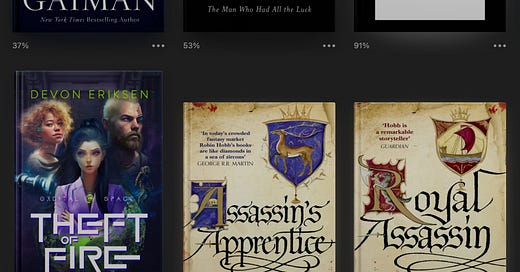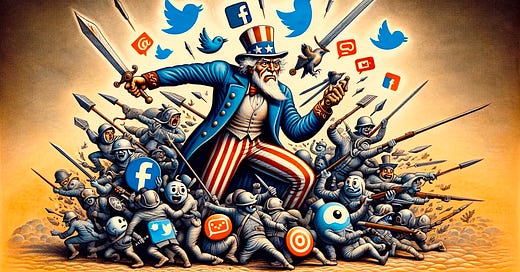Short Fiction Book Reviews: Volume I
A strange YA story from Gaiman, an even stranger one from qntm, Arthur Miller being kind of sad, Richard Llewellyn being really sad, two pulpy but good books and then one absolutely infuriating book.
The Ocean at the End of the Lane by: Neil Gaiman
There Is No Antimemetics Division by: qntm
The Man Who Had All the Luck by: Arthur Miller
How Green Was My Valley by: Richard Llewellyn
Theft of Fire (Orbital Space #1) by: Devon Eriksen
Assassin's Apprentice (The Farseer Trilogy #1) by: Robin Hobb
Royal Assassin (The Farseer Trilogy #2) by: Robin Hobb
The Ocean at the End of the Lane
By: Neil Gaiman
Published: 2013
181 Pages
Briefly, what is this book about?
A middle-aged man returns to the lane where he grew up. On a whim he decides to visit the house at the end of the lane. While there, some long-buried memories are unearthed concerning an incredible series of events which occurred when he was eight.
Who should read this book?
I think this is one of Gaiman’s weaker works. It was definitely enjoyable, but I would only read it if you love Gaiman and have read everything else. If you haven’t read any Gaiman I would start with something like The Graveyard Book (if you’re young or easily offended) or American Gods (if you’re neither). As far as this book I would shelve it under young adult.
Specific thoughts: It would be nice if characters could be wiser, but I suppose there would be fewer stories if they were.
Part of the reason why I consider this one of Gaiman’s weaker works is that getting to the main plot requires a complex series of events which don’t blend naturally from one into the other, and beyond that wouldn’t happen at all if the characters had been wiser. Still, if you can overlook that, the setting is lovely and the characters are great.
There Is No Antimemetics Division
By: qntm
Published: 2021
233 Pages
Briefly, what is this book about?
This book is set in the shared universe of the SCP foundation. My familiarity with the universe consists of just this book, but there’s a giant wiki covering the entire shared universe. This book concerns a department within the foundation that deals with threats who camouflage themselves by inhibiting the creation of memory—antimemes. Dealing with these threats is obviously very difficult. How can you fight something if you can’t even remember it exists?
Who should read this book?
If something starts out as a self-published story on the web and becomes hugely popular, enough so that you hear about it from multiple people, then it’s probably really good. Such is the case with this book. It’s one of the better science fiction novels I’ve ever read. Though if you don’t like Phillip K. Dick, you might not like this.
Specific thoughts: Successfully executing on a great premise
Lots of books have amazing premises, and I’ve been sucked into a lot of novels based on the premise only to discover that coming up with a fantastic premise is one thing, bringing it to a successful conclusion is quite another. Happily this book does both, not only does it have a great premise, but its execution is fantastic as well.
I can’t say much more without spoiling it, but as much (maybe all?) of it is online if you’re on the fence, read this short excerpt. However much you like that, multiple it by at least five.
The Man Who Had All the Luck
By: Arthur Miller
Published: 1944
82 Pages
Briefly, what is this book about?
A young man who experiences a tremendous amount of good fortune, and is constantly waiting for the other shoe to drop.
Who should read this book?
I listened to this performed as a play (which indeed it is) and found it a very enjoyable way to spend a couple of hours. It’s not Miller’s best play, but it’s still quite good.
Specific thoughts: What is the role of fate in our lives?
One of the characters talks about how humans are like jellyfish, the tide goes in, the tide goes out, and the jellyfish has no control over that fact. And certainly some things in the play do really feel like great good fortune for David Beeves, the titular character. But some things he was just really conscientious about, and that can be mistaken for luck.
This play has a happy ending, unlike Death of a Salesman the other Miller play I’m most familiar with. Salesman shouldn’t be the saddest play I’ve ever read, but it is. I think Miller is better at telling sad stories, which can be seen in this play as well. David has a brother named Amos who has been trained from his youth by their father (played by Kurtwood Smith, the father in That ‘70s Show) to be a major league pitcher. Unfortunately the training his father gives him doesn’t prepare him at all for the stress of an actual game, and so despite having a great pitch he gets passed over by the scout. The scene where the scout breaks the news to them is heartbreaking.
As one final thought. It’s good to branch out. Certainly listening to plays is not my normal diet, but I’m glad I did it. I think I may be looking for others.
How Green Was My Valley
Published: 1939
306 Pages
Briefly, what is this book about?
The trials and tribulations of the Morgans, a Welsh family deep in coal country, as told through the eyes of one of the sons, Huw.
Who should read this book?
This belongs to that class of books that were once very popular but have now largely been forgotten. However, should you decide to read one then you immediately understand why they were so popular, particularly if you’re able to put yourself in the headspace of the people who made them popular.
You might be wondering whether you should watch the movie, which won the Best Picture Academy Award in 1941. I don’t think it has aged quite as well. It was interesting to watch the movie after reading the book, but I wouldn’t recommend watching the movie without reading the book, and just reading the book by itself is entirely satisfying.
Specific thoughts: An idealized view, but one that fooled a lot of people
The book is realistic enough that people assumed it was “based on a true story”. It was not. Llewellyn never explicitly claimed that this book was autobiographical, but he never clarified that it wasn’t either. Which I guess is something you could get away with back then, though it’s also a testament to how good the book is. It feels like a true story. Certainly one where the rough edges have been sanded down, but there’s never a point where you feel like Llewellyn doesn’t know what he’s talking about.
To be clear, he did spend some time in Wales talking to some of the old folks about coal mining, and he even did a little bit of mining himself, but I would argue that it wasn’t just that he understood what the Welsh went through, but that he felt it, deep in his soul. The level of feeling he was able to bring to the book makes you really empathize with the miners and their families. As I have said elsewhere, in the early part of the 20th century, most writers and artists were very sympathetic to communism. Steinbeck, Hemingway, and even Orwell in his earlier years. You can add How Green Was My Valley to the list of books that make unions and socialism the only moral solution to the grinding plight of the working poor.
However, for all the wisdom and moral rightness of the men joining unions and striking, my sense was that the preacher really had the best arguments. He wasn’t necessarily anti-union, but he did urge the men to consider personal righteousness first. And I know that’s exactly the kind of thing that drives the antireligious nuts, but in this case, and many other cases I believe it was the correct advice.
Theft of Fire (Orbital Space #1)
By: Devon Erikson
Published: 2023
497 Pages
Briefly, what is this book about?
Marcus Warnoc, a good man on the wrong side of the law, returns one day to find that his asteroid miner has been commandeered by the impossibly beautiful Miranda Foxgrove, a member of one of the wealthiest families in the solar system. Foxgrove has bought all of Warnoc’s debts and moreover has enough information on all of his misdeeds to blackmail him. She uses this to force him to embark on a dangerous mission into the trans-Neptunian space.
Who should read this book?
I quite enjoyed this book, and I’m looking forward to the next one (which has not been released yet.) I thought it was a great addition to the genre of near future sci-fi (think the Expanse Series) with lots of great twists. So if any of that sounds appealing I would recommend picking up this book.
Specific thoughts: Making the protagonists’ situation believable
There are many books and series where it’s just not believable that the protagonists would be as important and well-positioned as they are. That there wouldn’t be thousands of other people along for the ride or doing things of greater importance at some point during the story. Speaking of the Expanse Series, it has this problem in spades. But also something like Star Wars is a huge offender, nothing really happens without the Skywalker siblings or their close friends.
Now it may be far too early to say, since we’re only in book one, but Theft of Fire, despite having basically only three characters and stakes that encompass all of humanity, cleverly avoided that problem. I don’t know if Erikson will be able to continue pulling it off, but for this first book, it’s entirely believable that this is how it would go down, and that it really would be these three characters at the center of everything. I found that to be fantastically refreshing.
Assassin's Apprentice (The Farseer Trilogy #1)
By: Robin Hobb
Published: 1995
448 Pages
Briefly, what is this book about?
Fitz, a royal bastard, is brought to court and trained to be an assassin, among other things. The novel is a bildungsroman, a labyrinthine tale of court intrigue, and an allegation that talking to animals is probably the first step to becoming a werewolf and eating everyone.
Who should read this book?
I’ve been looking for some non-litrpg fantasy to read and this was recommended by a lot of people. I quite enjoyed it, enough so that it took real willpower to not immediately start the second book, once I finished the first one. (See the next review if you want to know how that went.)
A word of caution up front. Apparently the Farseer Trilogy is the first of five trilogies in this world, and most people seem to think that you should read all five trilogies. If you balk at this, there are various compromise recommendations for trilogies you might be able to skip, but the one thing everyone agrees on is that you definitely can’t stop after the first trilogy. It doesn’t have a satisfactory ending and you have to read at least one more trilogy to get a decent ending. Which means reading this book apparently puts you on the hook for at least six books, and possibly fifteen. (Or, you can quit 80% of the way through the second book, in a fit of annoyed pique.)
Specific thoughts: A great job illustrating character and ideological complexity
Fitz has an inborn magical talent called the “Wit”, which allows him to bond and communicate with animals. The use of this talent has been made taboo by the culture in the novel, because the bonding appears to make the person using the Wit increasingly animalistic. Fitz’s guardian, Burrich, keeps trying to hammer this into Fitz, but of course it wouldn’t be much of a fantasy novel if Fitz didn’t use his innate magical powers!
I found the treatment of the Wit, and especially Burrich, to be exceptionally nuanced. Burrich is portrayed as a hard man, and a stern guardian, but you also never doubt that he cares for Fitz. Hobb also walks a fine line with the Wit. You can see both how it seems natural and harmless to Fitz, while at the same time understand that Burrich is warning him about a real danger, one he’s too young to fully appreciate. These are just a couple of examples, but as a whole I thought all the characters were very well crafted.
Royal Assassin (The Farseer Trilogy #2)
By: Robin Hobb
Published: 1996
688 Pages
Briefly, what is this book about?
Fitz, the royal bastard, ends up at the center of a nation being torn apart both externally by the Red Ship Raiders and internally by an ambitious prince willing to sacrifice everything for power.
Who should read this book?
I’m not sure. This is one of those series lots of people love, but, personally, I stopped reading about 80% of the way through out of annoyance. And I have no intention of picking it back up.
Specific thoughts: Why was I so annoyed?
Before we get to my annoyances let’s start with what I liked about this book, and the series. To begin with I really liked the first book, so much so that I bought a really nice hardback, illustrated copy of it. (After abandoning the second book I’ve decided to return it.) I also really like the characters, the relationships, the writing, the descriptions, the world building, and the magic system. So what element did I not like? What element was handled so poorly that I couldn’t take it anymore? The political intrigue.
As I discuss what I found so objectionable, bear in mind that I find myself getting more and more critical—more and more nitpicky—the older I get. Or at least I think that’s what’s happening. I mention this because it’s entirely possible that you won’t be bothered at all by Hobb’s handling of political intrigue. Unfortunately I found it intolerable.
In order not to spoil things, let me describe everything in relation to Game of Thrones (which had fantastic political intrigue.) In Royal Assassin you have someone similar to Joffrey, but there are several key differences. Let me describe how the prince in Royal Assassin differs from King Joffrey.
In Game of Thrones there are multiple schemers, each with their own interesting plans and goals. In Royal Assassin only the prince schemes, and his plans and goals are not interesting, they’re simple and yet also somehow they never go awry.
And when I say there is just one, I mean it. In Royal Assassin the good guys basically don’t scheme at all. In fact they seem particularly clueless and ineffectual. It’s unforgivable for anyone to ignore obvious traitors in their midst, but the main character is as much a spy as he is an assassin and so it’s especially unforgivable for him. There is something of an in-universe reason which prevents him from acting directly, but political intrigue is all about acting without appearing to act, and Fitz does none of that.
In Game of Thrones there are many scenes of scheming. We get to witness the schemers in action. But we don’t see the prince scheming at all. Everything he does is off screen. We don’t have any insight into the logistics of his schemes or the difficulties he faces. He just inevitably and comprehensively succeeds at everything he tries, no matter how outrageous the scheme is.
Recall that he’s just the prince, and not even next in line to the throne. Joffrey is at least the king. Yes, the king in Royal Assassin is slowly dying and drugged up most of the time, but he’s still around, and has moments of lucidity. Also, and perhaps this was intended to be ironic, his name is Shrewd.
In Game of Thrones you have characters that occasionally get the better of the schemers or call them out. When considering Joffrey the best example is Tyrion, but there are others as well. There’s no one like that in this book. So you hate Joffrey but you get breaks from time to time. There were no such breaks in my hatred for the prince. Perhaps that’s what the book was going for, but if so it was not something I enjoyed. And it bled over into a hatred of the protagonists as well because they weren’t doing anything about it.
Your experience may differ, but together these elements were annoying enough to so overshadow all of the book’s other good qualities, that it’s one of the rare books that I did not finish.
This represents yet another experiment in packaging book reviews. Let me know what you think. I still seem to be having a problem with the “short” part of the title, but I assume that’s mostly something that bothers me, not you, but if I’m wrong about that let me know.













